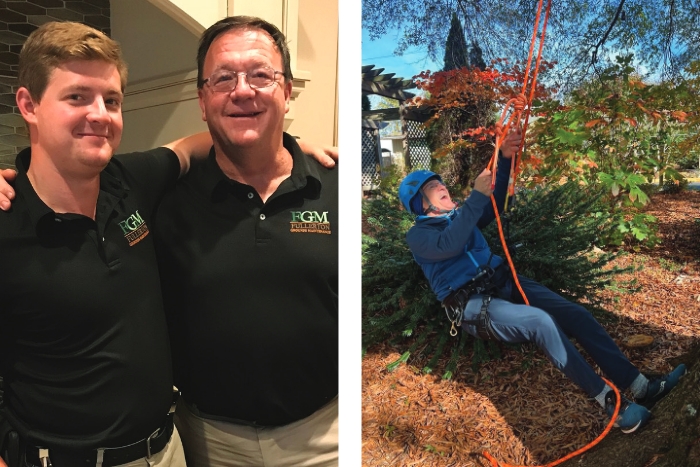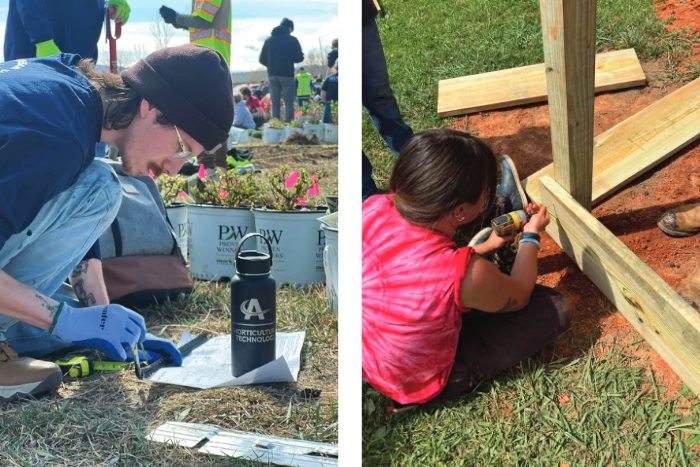Ten years ago, Scott Fullerton’s ideal employee was one with a strong work ethic. Today, the owner of Fullerton Grounds Maintenance in Kenvil, New Jersey, has revised his vision of the perfect candidate for employment, and it’s reflective of how the industry and its future leaders are evolving.
“Back in the day, I would teach you what you needed to know if you had a good work ethic,” Fullerton says. “Today, I’m looking for someone with an understanding of technology, someone who can pick up and understand software, someone who can understand how software and computers think.”
That’s because the landscape irrigation and lighting industries, which have traditionally been centered around physical labor from dawn to dusk, is adapting to and changing with new technologies and evolving ideas about careers.
The changing face of the industry
The introduction of new time-saving technology has been and will continue to revolutionize both the industry and its workforce. That’s a good thing, because Fullerton says the COVID-19 pandemic affected all aspects of the labor market, from upper management to the laborers.
“The new generation of leaders have learned from experiencing the pandemic, and they are demanding more time to themselves,” Fullerton says. “We’re landscapers. We work from sunup to sundown. We work on Saturdays. But when people got a chance to be at home, they thought it was great. It’s a good thing, putting priorities where they belong, but we have to evolve our business to accommodate that.”
While employee priorities have evolved, the industry has also evolved, creating a turning point for recruiting the next generation of industry professionals. And the face of the industry’s future is different from leaders of previous generations.
“Traditionally, blue-collar work has been looked down upon, and kids don’t want to go into fields like landscaping,” Fullerton says. “It’s difficult to find people to do that. But the new people we are looking for are different. There is a revolution with AI and new technology that will allow us to attract young people into the blue-collar world, because it is becoming less blue collar.”
For example, landscape lighting is more than digging and electrical work, as Fullerton says that today’s lighting systems need to be strategically designed at a desk before being installed in the field. With ever-changing improvements and advancements in irrigation technology, irrigation systems also need to be designed and carefully programmed with information like weather patterns, predictions and soil conditions.
“There will aways be hand labor involved, but with machines and technology getting more specific, it is part desk job and part work in the field,” Fullerton says. “It is the best of both worlds, and I think that is appealing to a lot of kids.”
Educating and attracting the next generation

At Penn State University, Brad Jakubowski, CIT, says that he often welcomes guest speakers to his classes. According to the assistant teaching professor of plant and irrigation science, the specialized knowledge guest speakers bring complements active, hands-on learning.
“We recently had a guest speaker from a manufacturer who put on a PCV solvent welding workshop for students, and she also shared the new things coming down the pike,” Jakubowski says. “Same with other manufacturers, who will come to share what’s happening with things like wireless or smart controllers.”
In addition to providing students with basic skills, Jakubowski says he focuses on developing critical-thinking skills, skills that will help students solve problems in both the classroom and the field.
“My seniors work with an all-volunteer-run baseball field operation, where they go out and help advise people on how to care for their facilities,” Jakubowski says. “We try to get them out there and apply what they’ve learned in the classroom before they graduate. It’s nice to see this new generation learn old-school applications, as well as new-school applications, and put those together to help meet the needs of the new industry, while having a solid understanding of the old industry.”
At Alamance Community College in North Carolina, Caleb Fox, CIT, lead instructor for the horticulture technology program, says he also teaches students the basics through hands-on experiences. He does not give a lot of assignments in order to ensure that what students do have to do is memorable.
“I assign them a landscape area, and it is theirs to manage,” Fox says. “I teach them to manage their area through things like pruning, pest management and the use of equipment.”
As they build a foundation of basic skills, Fox says a key piece of the educational program is exposure to the latest and greatest in tools and equipment with the help of manufacturer representatives.
“A lot of the hands-on learning projects help train them and teach them the correct way to do something,” Fox says. “We go outside and get our hands dirty to make sure they are well prepared. That way, when they go into the industry, they have the skills. But I also bring in guest speakers, which encourages students to learn from and hear from others beyond what they hear in a lecture or learn in a lab.”
One manufacturer recently brought robotic and battery-powered mowers to campus. Opportunities like that help students understand how technology is evolving and how they have to adapt to new technology, Fox says.
“One of the students was allowed to operate the battery-powered mower, and when he got on the mower, he was ecstatic,” Fox says. “It is quiet, it is amazing and he thought it was awesome.”

Working alongside an industry expert to install an irrigation system or try out new equipment is often a meaningful experience for students, and Fox says that he typically picks up new information as well.
Just as manufacturing representatives are helping to prepare the next generation of leadership in the classrooms, they are the ones with the most up-to-date knowledge, helping businesses train their upcoming leaders.
“There are people who are technology-capable, and we have to find them and sell them on the industry. I am looking for people who want to be trained, and we will put up the financials to bring in the manufacturer’s reps to teach them,” Fullerton says. “They will need to learn how to use [the technology], how to maintain it, how to run reports.”
Orienting a new employee to their landscape job used to mean taking 10 minutes to show them how to run a mower, Fullerton says. That’s not the case today and will certainly not be the case in the future.
“Today you bring in people for very specific uses, not for general labor,” Fullerton says. “If you’re working with a manufacturer on robotic mowers, that person is going to be trained to come in for the specific job, and until it becomes more commonplace, we’re going to really depend on the people designing it and selling it to do the training.”
An industry of the future
While embracing and implementing change is always hard, Fullerton says that he believes the changes in the industry will all be for the better, as they will make it more efficient, allow more time for family, and be better for the environment.
“The new technologies will help us reduce labor and stay efficient so we don’t have to pass costs on to customers, and the hope is that technology will help us stay competitive and stay in business,” Fullerton says. “We want to attract people who are more interested in technology than in digging holes. We try to sell that landscaping is a career option for the rest of their life.”
According to Fullerton, there will soon come a time when companies will have to be technology-forward to keep business healthy. While he admits that it can be hard to change the way things have always been done, he says the key is identifying and hiring the next generation of leadership, as they will be the ones to carry the industry forward.
“These will be the guys who can help us transition to the robotics and irrigation technology,” Fullerton says. “In the next five to 10 years, you won’t have eight people walking behind mowers, you will have one person monitoring the machines from a truck. They will reposition them here and there, but it will be much less labor intensive. We are looking to recruit younger laborers who are more adept at handling these technologies.”
As a business owner, Fullerton says he is open-minded about who those future leaders may be. “You won’t necessarily find them in the fields you think,” he says. “The future of the industry is focused on the generation coming out of college ready to use technology.”





